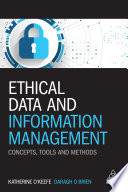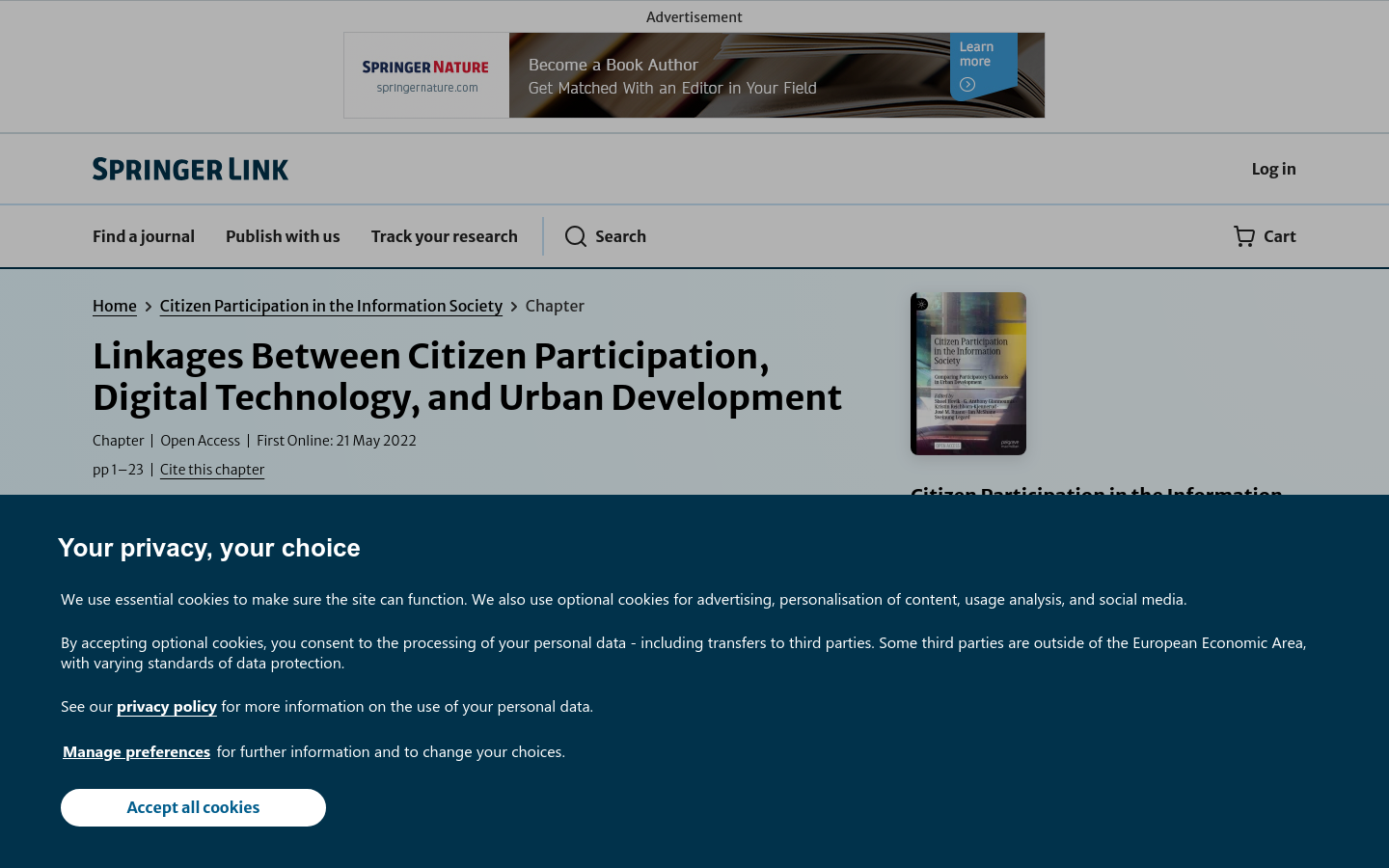Civic Tech Field Guide
Sharing knowledge and productively growing the fieldSearch Results - ATI (8148)
Showing 8148 Results

The Oxford Handbook of Deliberative Democracy takes stock of deliberative democracy as a research field, in philosophy, in various research programmes in the social sciences and law, and in political practice around the globe

Governments can use artificial intelligence (AI) to design better policies and make better and more targeted decisions, enhance communication and engagement with citizens, and improve the speed and quality of public services

This book will be discussed in an online roundable on the Social Epistemology Review and Reply Collective

Digital Democracy: Political Participation and Citizen Engagement Through the Internet
United Kingdom of Great Britain and Northern Ireland (the)This Library Note provides an overview of developments around citizens’ political engagement and participation through the internet.

Focusing on case studies in areas which are undergoing major social and institutional transformation and/or which raise particular issues because of the "marginal" position of the areas within their nation-states...

Interdisciplinary discussion of the ways in which the media is and can be used in the service of deliberative equality within the public sphere--and of the ways in which the media can function to both facilitate and inhibit deliberative

This is the latest volume in the distinguished Philosophy, Politics and Society series, known for engaging debates that cut across political science, philosophy, the law, and other disciplines

This book will be essential reading for students and scholars of democratic theory, as well as anyone who is curious about the prospects for more rational decision-making in an age of populist passion

"This volume strengthens the dialogue between conceptual perspectives, approaches, and fields on deliberative and participatory forms of democratic innovation and offers novel insights, focusing on the Southeast European space."

In Collaborative Governance for Urban Revitalization, Michael J. Rich and Robert P. Stoker confront the puzzle of why the outcomes achieved by the original Empowerment Zones varied so widely given that each city had the same set of federal ...

Throughout the book, comprehensive surveys of democratization research demonstrate that each approach accomplishes one of these goals well but the other two poorly

This book covers: creating meaningful innovations that improve quality of life, engage users and provide value for organizations and other stakeholders, guiding the creation of shared value throughout the innovation process, with a ...

newDemocracy Foundation
New South Wales, AustralianewDemocracy is an independent, non-partisan research and development organisation. We aim to discover, develop, demonstrate, and promote complementary alternatives which will restore trust in public decision making.

This book provides a concise and usable overview of the practical implications of important public sector United States federal, state, and municipal laws and standards related to information governance, as they pertain to librarians, research staff, universities, corporate regulatory managers, and public-sector information governance professionals. It is the first in a series of two volumes addressing public sector information governance compliance matters from the perspective of our target audience. Topics addressed in the book include: the evolving role of librarians and the need for librarians and legal researchers to understand the principles of information governance, the importance of broad-based regulatory IG principles such as the Federal Records Act, the Paperwork Reduction Act of 1980 and 36 CFR Chapter XII, Subchapter B – Records Management, that have been promulgated by various federal government agencies in framing public-sector IG principles, a survey of interpretive surveys from the Office of Management and Budget (OMB) that further elucidate the core IG principles applicable to public sector stakeholders, case studies detailing the application of important IG principles by federal agencies and bodies, and a survey of important IG issues facing state and local governments.

The Committee on National Statistics of the National Academies of Sciences, Engineering, and Medicine convened a 2-day public workshop from December 11-12, 2019, to discuss the suite of data products the Census Bureau will generate from the ...

This book charts this influence and describes the unique effect electronic communication has on organizations, communities, nations, and cultures--Provided by publisher

This critical tour through recent democratic theory examines the deliberative turn in democratic theory which argued that democratic legitimacy is to be found in authentic deliberations on the part of those affected by a collective decision

This book examines deliberative democracy and its practical forms and applications in local government public policy

Drawing on diverse theoretical perspectives, this book examines questions of youth citizenship and participation by exploring their meanings in policy, practice and youth experience. It examines young people's participation in non-government and youth-led organisations, and asks what can be done to bridge the democratic disconnect.

Contributors explore issues of ethics, politics, and positionality in their work. This book highlights the importance of respecting multiple knowledge streams, worldviews, and practices situated in a place.

Ideal for art and media educators within preservice and higher education spaces, this book equips readers to prepare their students to be thoughtful and critical producers of their own media that can effectively advocate for social change.

Resource guide for children for learning political action skills that can help them make a difference in solving social problems at the community, state, and national levels.

Is this true? In Uneven Innovation, Jennifer Clark considers the potential of these emerging technologies as well as their capacity to exacerbate existing inequalities and even produce new ones

This book provides a new analytical perspective on the strategies, membership and communication management of political parties in Poland

This book discusses spatial practices of autonomous social movements, the movements who ‘see their everyday experiences and creations as the revolution they are making’, together with these movements and in taking the diversity of their ...

Whether you're an IT specialist, a city planner, a human resources manager, or any other professional in local government, this book offers a wide array of prompts designed to stimulate innovative solutions, streamline operations, and ...

In democratic societies there is widespread acknowledgment of the need to incorporate citizens’ input in decision-making processes in more or less structured ways.

To make this work financially and sustainably, designers are utilizing a variety of for-profit and nonprofit business models.

This book is the story of Delmer and his modern investigator, as they each embark on their own quest to manipulate the passions of supporters and enemies, and to turn the tide of an information war, an extraordinary history that is ...

The world is a heavily segregated place where we are first separated by the seven continents, broken down into many countries, then by cities, trickling all the way down to towns branching off into neighborhoods and individual homes that ...

This book relies on the conceptual model of Open Government (OG), focusing on transparency and, concretely, in open data initiatives at the local government context with the aim of improving participation and collaboration.

This book assesses the interplay between social media, political polarization, and civic engagement, focusing on countries with differing media environments, cultural specifics, and degrees of democratization

This book contributes to this endeavour by bringing together cutting edge research on the theory and practice of deliberative systems

The book features contributions that report original research in the theoretical, technological, and social aspects of geoinformation methods, as applied to supporting citizen science.

Information and how we manage, process and govern it is becoming increasingly important as organizations ride the wave of the big data revolution. Ethical Data and Information Management offers a practical guide for people in organizations who are tasked with implementing information management projects. It sets out, in a clear and structured way, the fundamentals of ethics, and provides practical and pragmatic methods for organizations to embed ethical principles and practices into their management and governance of information. Written by global experts in the field, Ethical Data and Information Management is an important book addressing a topic high on the information management agenda. Key coverage includes how to build ethical checks and balances into data governance decision making; using quality management methods to assess and evaluate the ethical nature of processing during design; change methods to communicate ethical values; how to avoid common problems that affect ethical action; and how to make the business case for ethical behaviours.

Its key proposition is that, in politics, it is not only power that counts, but good discussions and arguments too

This book explores contemporary urban experiences and how they are connected to practices of sharing and collaboration.













